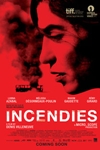- REVIEW
- READER REVIEWS
Incendies
|
|
Genre
Drama
Distributor
Sony Pictures Classics
Release Date
Apr 22, 2011
Release Notes
NY/LA
Official Website
Review
For two hours, Denis Villeneuve’s Incendies plays like an essentially realistic—and riveting—mystery. It’s a dual story: of French-Canadian brother-and-sister twins compelled by the will of their dead mother to locate a father they thought died decades earlier and a brother they never knew existed; and, in flashbacks, their mother’s early life, careering from bloody horror to bloody horror amid right-wing Christian militias massacring Muslims and Muslims massacring Christians right back. (The country goes unnamed but is obviously Lebanon.) Then, ten minutes from the end, there’s a preposterous turn, and Incendies stands revealed as a heavily symbolic piece of mythmaking, a threnody for a culture in which families are perverted by what one character calls “the merciless logic of reprisals.” The movie doesn’t quite jell, but you’ll feel its sting for hours.
Incendies is based on a play by Wajdi Mouawad, who fled Lebanon for France when he was 8, but you’d never guess the movie’s origins until those final scenes. Villeneuve has made it breathe onscreen, so that you feel as if you’re moving—like the twins, Jeanne (Mélissa Désormeaux-Poulin) and Simon (Maxim Gaudette)—through a maze, on the grimmest scavenger hunt ever. The life of the mother (Lubna Azabal) is a grisly snarl of atrocities in which every vengeful action produces an unequal and ungraphable reaction. Jeanne, thoroughly Westernized, teaches “pure mathematics”—but the new equation for their lives won’t and can’t add up.
Azabal’s performance is beyond my powers of description, her character bludgeoned to the point where her self-containment is a matter of survival. The movie contains one attack on a bus that builds to a hideous climax, and it’s rife with sexual assaults and the deaths of children. But Villeneuve’s handling of these scenes is subtle, nonexploitative. The opening, in which battered young boys have their heads shaved by what appears to be a Muslim militia, is set to Radiohead’s “You and Whose Army?” and ends with one boy staring balefully into the camera—a stare that eats into the mind. This is an extraordinary film.
